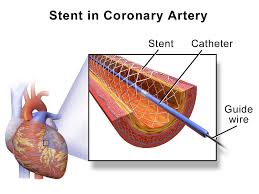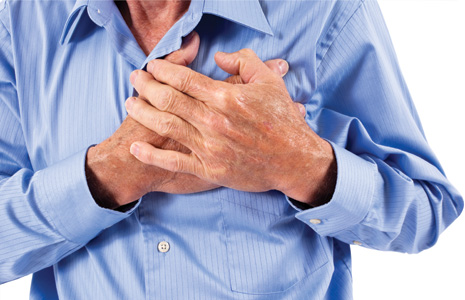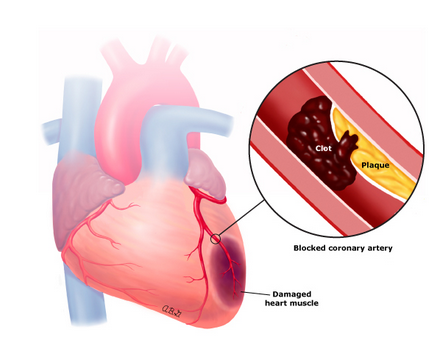Heart Attacks: What You Need to Know
What is a heart attack?
The heart is a muscle that needs constant blood flow to provide the oxygen the muscle needs to survive. When arteries in the heart become partially or completely blocked the muscle stops receiving the oxygen it needs and therefore it can result in heart muscle death, called a heart attack. Outcomes from heart attacks can be more or less severe depending on where the artery is that is blocked, how severe the blockage is and how long it takes to get the blockage resolved.
How does that happen?
These blockages can be caused by plaque buildup on the artery walls that are usually made up of fat, cholesterol and other particles found in the blood. If a plaque breaks or ruptures, a blood clot will form which can cause partial or complete blockage of the artery, leading to a heart attack. Plaque ruptures are the most common cause of heart attacks, however it is possible for the blood vessels in the heart to spasm and contract which can also lead to restriction of blood flow and cause a heart attack.
Am I at risk?
Anyone can have a heart attack, but age, gender, race, and family history are factors that can put you at a higher risk for heart attack, that you cannot change. Which means getting older, being male, having a positive family history of heart attack or heart disease, and being African American, Mexican American, American Indian, native Hawaiian or some Asian Americans increases your risk of having a heart attack.
Other risk factors include cigarette smoking, high blood pressure, high cholesterol, diabetes, obesity, sedentary lifestyle, poor diet, stress, alcohol, and use of cocaine. The good news about these risk factors is that you can do something about them!
What are the signs and symptoms of a heart attack?
Chest pain is the most common symptom of a heart attack, usually it is described as a crushing, squeezing, or  “elephant sitting on your chest” kind of pain as opposed to a stabbing or sharp pain. This pain can travel up your neck, to your jaw, through your shoulder, down your arm and possibly all the way to your fingers, most commonly on the left side. Other signs and symptoms include shortness of breath, belching, nausea/vomiting, indigestion, sweating, clamminess, dizziness, lightheadedness, and fatigue.
“elephant sitting on your chest” kind of pain as opposed to a stabbing or sharp pain. This pain can travel up your neck, to your jaw, through your shoulder, down your arm and possibly all the way to your fingers, most commonly on the left side. Other signs and symptoms include shortness of breath, belching, nausea/vomiting, indigestion, sweating, clamminess, dizziness, lightheadedness, and fatigue.
Although chest pain is the hallmark sign of a heart attack, it is possible to have a heart attack without ever experiencing chest pain, these are called silent heart attacks. In these cases, symptoms usually include difficulty breathing alone, palpitations, weakness, nausea/vomiting, fainting, or cardiac arrest. Silent heart attacks are most common in the elderly, women, and diabetics.
If I think I’m having a heart attack, what do I do?
CALL 911, then chew and swallow one 325 mg aspirin OR four 81 mg aspirin tablets!
Treatment
Emergency services and the medical team at the hospital will work together to determine how severe the heart attack you are having is and their plan of care. While in the emergency room they will give you supportive therapy such as pain control and oxygen. They will also monitor your heart and set up an IV line. The three most common treatments for heart attacks are thrombolytics, stents, and bypass surgery. Thrombolytics are given to break up the clot in the heart, they are usually given if you have a complete blockage and you are unable to get a stent for any reason. A stent is a metal device that is threaded into the blocked artery and expanded to open up the artery and push back the plaque to make the area larger so blood can move through more easily. Lastly, a bypass surgery is usually done when more than one serious blockage is found in the heart. It is an open heart surgery where they use vessels usually from your legs to re-route the blood flow in your heart around the blocked arteries to restore blood flow.
is a metal device that is threaded into the blocked artery and expanded to open up the artery and push back the plaque to make the area larger so blood can move through more easily. Lastly, a bypass surgery is usually done when more than one serious blockage is found in the heart. It is an open heart surgery where they use vessels usually from your legs to re-route the blood flow in your heart around the blocked arteries to restore blood flow.
When you are discharged from the hospital your health care team will send you home with prescriptions tailored to your needs to help you prevent a second heart attack. These often include a daily aspirin, cholesterol medicine, and a heart medicine such as a beta blocker. Other medications such as blood pressure medicine, an anti-platelet medicine(keeps the platelets in your blood from being too sticky to prevent clots), and nitroglycerin are also possibilities based on your specific case.
How do I prevent a heart attack?
The best way to prevent a heart attack is to decrease your risk. You can do this by choosing healthy diet options, adding exercise into your week, and by getting any medical conditions that you already have been diagnosed with under control. Other good ways to reduce your risk include stop smoking, decrease stress, avoid illicit drugs, and limit alcohol consumption to one drink or less/day for women and 2 drinks or less/day for men. If you have been diagnosed with high blood pressure, high cholesterol, and/or diabetes, work with your healthcare provider and pharmacist to stay on track with your medications and control these conditions!
How can HPP help?
Health Park Pharmacy is more than just a pharmacy. We are here to help you through every part of your healthcare needs.We offer:
- Vaccines such as flu, pneumonia, and shingles to keep you healthy
- Smoking cessation products and counseling
- Convenience packaging called Dispill and free delivery
- Medication management and counseling
- Project Harmony- our very own transition of care program
Project Harmony is a program we developed to make changes in your health care as easy as possible. In the case of a heart attack, we would review your discharge paperwork from the hospital and rehab facility. From there we will review medication changes or updates from admission and communicate with all of your health care providers, especially your primary care doctor to make sure they are up to date! Project Harmony fills the gaps in health care and creates a community of providers that are united for your best care! Call or stop by to see what Health Park Pharmacy can do for you!
References:
http://www.heart.org/HEARTORG/Conditions/HeartAttack/AboutHeartAttacks/About-Heart-Attacks_UCM_002038_Article.jsp
http://content.onlinejacc.org/article.aspx?articleid=1486115
http://content.onlinejacc.org/article.aspx?articleid=1910086


